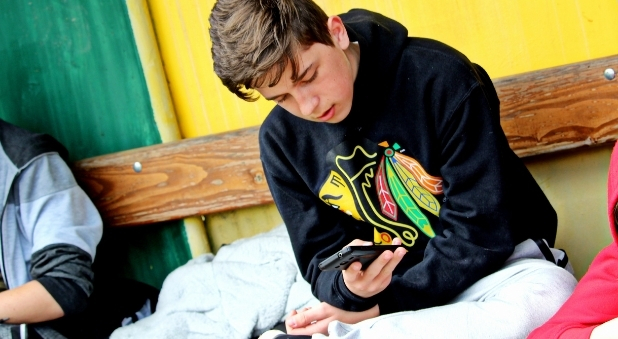It’s obvious that social media and technology are changing the fabric of society, but recent Netflix documentary The Social Dilemma went further, showing how technology is designed to keep us scrolling and how it is shaping how we think and analyse situations and events.
That’s a problem in anyone’s language – and we don’t just need to work on the challenges of this for ourselves, but for our kids. Findings by McCrindle Research released earlier this year show that, on average, kids between the ages of five and 17 spend up to 3.5 hours each weekday using screen-based devices. That’s almost 40 per cent of their total waking hours.
“Phones in particular have potential to be an issue,” says the Rev Al James, youth ministry advisor for Youthworks, who has witnessed the challenges phones pose to young people as he visits many youth groups. “Phones out during talks and discussion groups with every member scrolling on their phones is not hard to imagine. It’s a constant distraction, and there is an addictive quality.”
He recognises screens have a lot of positive contributions to offer, and encourages people to use screens as socially as possible. “The more personal and less social the screen is [ie.the smaller it is], the greater the potential for usage without social discernment or community discernment,” he says. “It has the potential for issues. There is a secretive element, which is a spiritual danger for young people.”
Mr James recommends families encourage consumption of content on big screens whenever possible, so parents can model how to view wisely and with discernment.
“Monitoring or making rules [around screens] is not an invasion of privacy, it is parenting.”
“Families need to work out their values together,” he says. “Christian parents, you are parents. Monitoring or making rules [around screens] is not an invasion of privacy, it is parenting. Just as we help our children navigate other issues in life, we have a responsibility to navigate the digital terrain.”
Have the conversation early, and also have it late
It is vital that families discuss use of screens early and often, and Mr James recommends parents initiate these conversations. “Don’t wait until there are issues,” he says. “Ask your children, ‘What do you think about this?’ or ‘I heard this on the news, what do you think?’”
And for those of us who haven’t raised the topic with our children yet, he assures us that it’s never too late. “Screen limits and arguments with teens [may happen], but it’s worth having hard discussions. Especially because of the secrecy nature of screens.”
We didn’t grow up in the “golden years”
“God is sovereign over all, even the suffering inflicted through these mediums,” Mr James says. “He can be trusted. If we grew up in the golden years, we just didn’t see the challenges [of screen use]. Now is no different, even in a screen pandemic. When we think about suffering and the bad results of screen time, this is God revealing the reality of sin when the things we put our hope in go wrong. Not that God inflicts suffering, but the world is broken. Our hope is in Jesus.”
He also encourages us to continue engaging with the Bible, even if it’s for small pockets of time together. “Don’t underestimate the power of the word of God. Our Bible time might be less than our screen time, but God’s word is powerful and sharper than any sword, and speaks to reality. So much of what we consume [on screens] distorts the truth.”
As the primary disciplers of children, this can all feel overwhelming for parents and caregivers but, Mr James says, “it is our responsibility. We can be there to help our children navigate these issues. God placed family in the lives of young people for a reason. It is right for us to give that community a place in helping young people.
“Operate with grace. Expect them to get it wrong. The best outcome is for them to come to you with the issues.”
Good screen guidelines for families
“Keep screen time as social as you can,” he says. “Where possible, don’t have screens in bedrooms. Kids can’t filter what they consume alone. How can you keep screen time a part of the conversation? Let family and the word of God speak into our circumstances.”
Parents also need to be careful how they react when children confess they’ve seen something online that they shouldn’t have.
“The moment that you respond negatively to a child who confides in you that something popped up on their socials, that will reduce the likelihood of effective ministry,” Mr James says. “Operate with grace. Expect them to get it wrong. The best outcome is for them to come to you with the issues.”
Above all, Mr James emphasises the importance of providing places and spaces for children to share what is going on and for parents to understand what their children are consuming. “Foster moments of connection so there is room for conversation. Take your child for ice cream, or make the most of other moments where you are spending time together.”






















